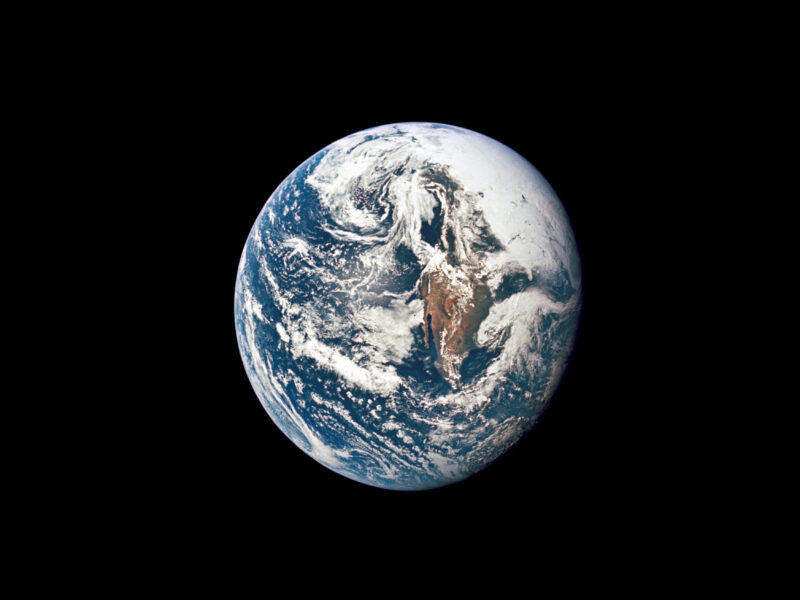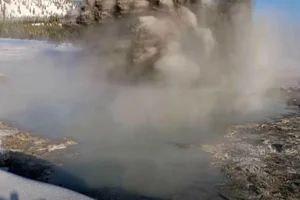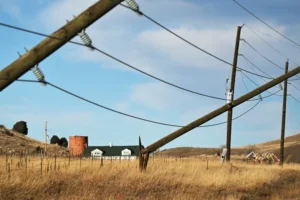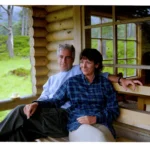Scientific Curiosity, the Cowboy Code or Conspiracy?
Wyoming residents search ‘flat Earth’ online more than nearly anywhere else in the U.S.
- Published In: Other News & Features
- Last Updated: Aug 31, 2023

Wyoming residents search "flat Earth" online more than nearly anywhere else in the U.S., but this NASA photo shows that the Earth is, indeed, round. (NASA via AP)
By K.L. McQuaid
Special to the Wyoming Truth
Wyomingites have long been proud of the “Cowboy Code of Ethics,” and there are plenty of good reasons why the 10 precepts adopted from James P. Owen’s famous book were codified into state law 13 years ago.
The Code might also just explain why residents of Wyoming went online and searched terms like “the Earth is flat” 18,120 times over the past 12 months.
At 310.66 searches for every 10,000 residents, Wyoming ranked third in the nation in so-called “flat Earth” Internet searches per capita, according to Google Keyword Tool data studied by BetKentucky, an online sports gambling website that is owned by a company headquartered on an island between England and France.
Only Alaska and Colorado ranked higher, based on the searches per 10,000 residents.Washington and Hawaii rounded out the Top 5.
Let’s break it down using the “Cowboy Code.” Owen’s No. 1 rule in the code is “Live Each Day with Courage.”
It could be viewed as courageous to believe – despite overwhelming evidence and countless photos from space – that the Earth is indeed more like a pancake than a ball.
Owen’s second principle urges Code followers to “Take Pride in Your Work.” Certainly,people who believe the Earth is flat, or look for evidence that it might be anything other than a sphere, take pride in that conviction, right?
Ken Hanson, an assistant professor of sociology in the University of Wyoming’s Department of Criminal Justice and Sociology who teaches a course that includes “unconventional beliefs,” explains it this way: “The numbers of those who hold unconventional beliefs are on the rise on the U.S., and they often focus on a range of topics, from being anti-science, a belief in political conspiracies about topics like the [President John F. Kennedy] assassination or a disbelief about the 1969 U.S. moonlanding.”
“We’re in a climate now that’s ripe for it,” Hanson added. “There’s a general distrust for institutions in this country and of what they’re telling us. The rationale becomes ‘If theycould lie to us about this, what else are they lying about?’”
Now, we’re willing to ponder the notion that maybe the folks looking up “flat Earth” online are doing so purely for entertainment purposes, the way some people watch cute cat or bear videos.
Or maybe all those searches are simply research for elementary school science papers.
We’re even willing to consider that New York Times’ columnist Thomas Friedman’s 2005 book “The World is Flat” played a role – though it deals with global economics, not astronomy.
And yeah, some folks just plain believe that the Earth is flat.
If there’s safety in numbers, the theory is a pretty safe one.
The phrase has gained over 4 billion views on the Chinese social media platform TikTok alone.
In the United States’ three most populous states – California, Texas and Florida – terms pertaining to flat Earth were searched online a combined 2,377,800 times over the past 12 months.
Hanson is not surprised by the numbers.
“People who hold unconventional beliefs tend to double down on them rather than evaluate contradictory evidence critically,” he said. “And remember, this has been going on for a long time, and typically what we find through research is that the more people there are who espouse a certain belief, especially in the age of the Internet, the easier it becomes to believe what’s being said.”
All that said, maybe Owen’s last rule in the “Cowboy Code” could apply to flat Earthersas well: “Know Where to Draw the Line.”













